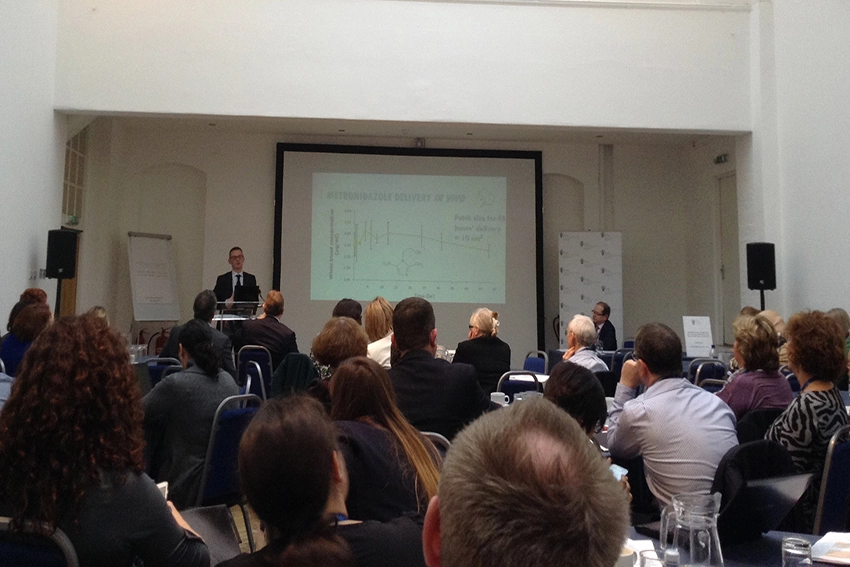
Corrinne Burns / The Pharmaceutical Journal
Conventional drug discovery is characterised by “too much secrecy, too much competition, too much duplication”. These were the words of Chas Bountra, professor of translational medicine in the Nuffield Department of Clinical Medicine and associate member of the department of pharmacology at the University of Oxford, speaking at the first Royal Pharmaceutical Society (RPS) Winter Summit.
In his keynote speech to the summit, which was held in London on 5 December 2017, Bountra described his alternative vision for drug discovery, encapsulated in the ethos of the Structural Genomics Consortium (SGC).
Bountra argued that pharmaceutical scientists have “no idea” how some common medications — including paracetamol — work at a molecular level. “If you don’t know how existing drugs work,” he asked, “how can you design better ones?” The SGC, he said, seeks to identify new drugs by elucidating the molecular structure of human disease proteins, and then generating antibodies and inhibitors specific to those proteins.
The consortium makes all data freely, and immediately, available, Bountra said, “to reduce duplication and waste”.
The Winter Summit also saw the announcement, by Catherine Duggan, director of professional development and support at the RPS, of two new expert advisory boards. The Faculty and Education board is chaired by Peter Kopelman, former principal of St George’s, University of London, and the Science and Research board is chaired by Christine Bond, emeritus professor in primary care at the Institute of Applied Health Sciences at the University of Aberdeen.
Research presentations
Among the other speakers on the day was Sarah Slight, reader in pharmacy practice at Newcastle University and winner of the RPS Practice Research Award 2017. Slight gave an overview of her research into how health information technology — computerised physician order entry and clinical decision support (CDS) systems — can improve patient safety.
During research into CDS systems, which alert physicians about potential drug interactions and allergies, Slight and colleagues found that physicians using the systems had manually overridden more than half of the alerts. Many overridden interactions, Slight said, had “the potential to cause patient harm”.
Maria Malamatari, research associate at the University of Greenwich department of pharmaceutical, chemical and environmental science, discussed her research into jet dispensing of multi-layered drug films. Jet dispensing — a form of inkjet printing — can, she said, be used to create a single tablet containing a personalised drug combination, which could be especially useful for older patients taking multiple medicines because it would “reduce adverse effects and increase compliance”.
The process is still in the optimisation stage, but Malamatari said that her current results using three antihypertensive drugs — hydrochlorothiazide, amiloride hydrochloride hydrate and carvedilol — show that the technique has “great potential”.
Dominic Wood, founder of Epic Health, spoke about the company’s smartphone app designed for non-invasive blood glucose monitoring. He said the company is conducting what he described as “the largest ever clinical trial for diabetes technology”, involving 2,100 people. The company hopes the trial will show that the app is as accurate as ‘gold standard’ needle-based glucose monitoring.
Ryan Donnelly of Queen’s University Belfast’s school of pharmacy, said that delivering antibiotics systematically through skin-embedded microneedles could reduce antimicrobial resistance (AMR). Colonic bacteria are the biggest source of AMR, he said, and therefore avoiding the gut route altogether has an obvious advantage.
Afternoon workshops
In the afternoon, delegates attended two workshops: one on data-driven innovation in pharmacy and another on the value of science in the MPharm degree. In the former, delegates considered questions including the potential uses of health data. Wearable devices were discussed, with one delegate saying that wearable glucose monitoring would improve patient self-care while allowing a suitably trained pharmacist to spot anomalies that might need professional management. Several delegates said that the MPharm ought now to include training on digital health literacy.
In the latter session, Nigel Ratcliffe, chair of the Pharmacy Schools Council, said that pharmacists must not “lose the knowledge that differentiates us from medics and others in the multidisciplinary team”. Stephen Messham, president of the British Pharmaceutical Students’ Association, added that science in the MPharm needed to be broad enough to proof against future developments. Most pharmacists have not studied genomics as part of their course, he said, but have a good enough grounding in science to understand it.
Prizes awarded
The day ended with the awarding of prizes for the best oral and poster presentations. Winner of the Research and Education oral presentation was Laura Doyle, presenting on behalf of Bethan Broad, both of the Wales Centre for Pharmacy Professional Education, Cardiff. Doyle’s presentation was entitled ‘Evaluating an integrated pre-registration training programme in North Wales: perceptions of pre-registration pharmacists and their tutors’. Matthew Peak of the Alder Hey Children’s NHS Foundation Trust, Liverpool, won the Pharmaceutical Science oral prize for his presentation on “Content uniformity of quartered hydrocortisone tablets in comparison with mini-tablets for paediatric dosing”.
The Research and Education poster prize was won by Shalini Ganasan, Queen’s Hospital, Romford, Essex, for ‘A pilot study of pharmacists working in an advanced role in the Urgent Care Centre Emergency Department: a quantitative study’. Safa Damiati of King’s College London and King Abdulaziz University won the Pharmaceutical Science poster prize for her reporting of ‘Artificial intelligence for solving solubility problems in drug development’.
All the oral presentation and poster abstracts from the Winter Summit may be accessed in two special issues, one of the
International Journal of Pharmacy Practice, the other in the
Journal of Pharmacy and Pharmacology
.
You may also be interested in
Long service of members

Membership fees 2022
